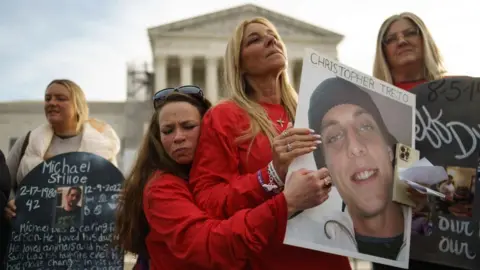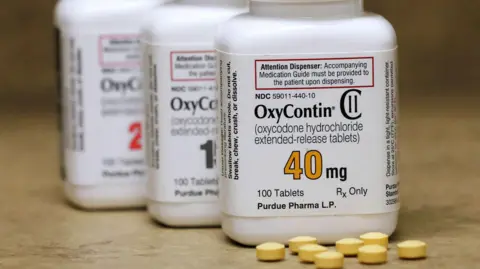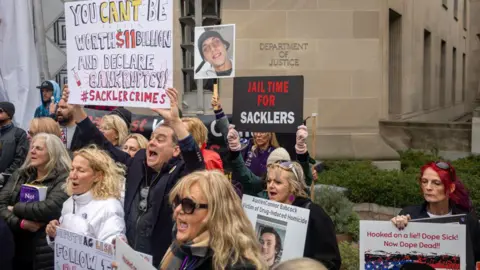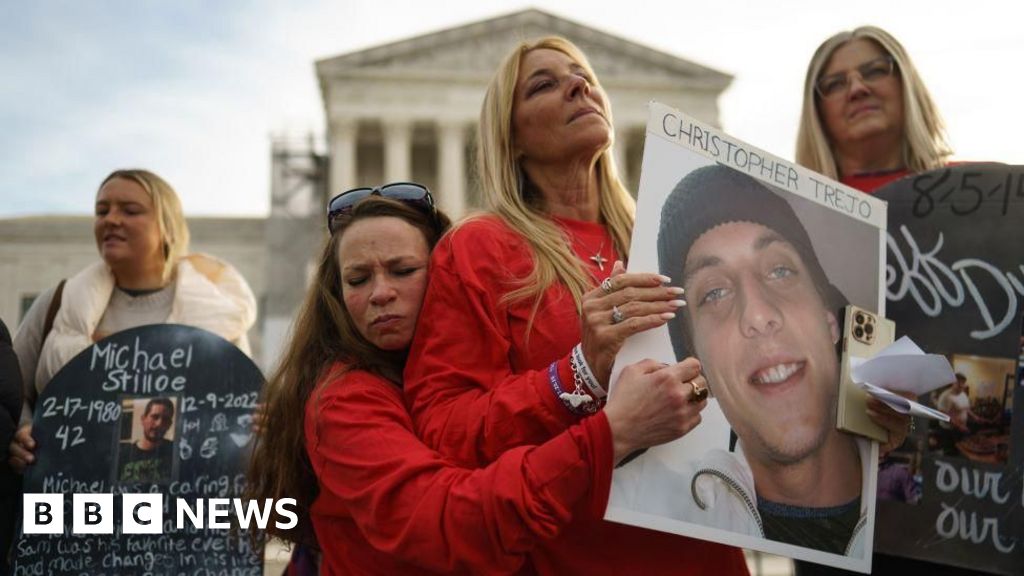By Natalie Sherman, BBC News
 EPA
EPAThe US Supreme Court has struck down a part of the bankruptcy deal for Purdue Pharma that would have shielded members of the Sackler family from future lawsuits over their role in fuelling the opioid crisis.
The Sacklers, who owned and operated the Oxycontin-maker for decades, had agreed to pay $6bn (£4.7bn) towards a wider settlement in exchange for sweeping protections against civil claims related to the addictive opioid.
But the nation’s top court ruled that granting such protections to the Sacklers, who did not themselves declare bankruptcy was not authorised under law.
Sackler family members said they would continue to push for a settlement, warning that the alternative was “costly and chaotic legal proceedings in courtrooms across the country”.
The ruling is a victory for the US government and others who had challenged the deal, arguing that releasing the Sacklers was a misuse of the system.
But it raises major questions about the future of the agreement, which had won significant, if mixed, support from many who sued the company and saw it as the only practical way to reach the family’s billions for drug treatment and other uses.
Ellen Isaacs, whose son Patrick Ryan Wroblewski died of an overdose in 2018 at the age of 33, was one of the family members who had opposed the shield for the Sacklers.
She said she was not sure what came next, but was hopeful that justice would be done.
“I’d like to see them held fully accountable,” she said. “I’m just so grateful to the Supreme Court right now I can’t get beyond that.”
 Reuters
ReutersPurdue became a household name in the US as the maker and promoter of OxyContin – a prescription painkiller it promoted as safe, despite being aware it was both highly addictive and widely abused.
The company declared bankruptcy in 2019, after it was hit by thousands of lawsuits brought by states, cities and families. It later pleaded guilty to criminal charges, including defrauding health agencies and making illegal payments to doctors.
The kind of shield granted to the Sacklers in this deal has been a critical feature of other high-profile settlements, including those involving Boy Scouts of America and the Catholic Church.
But courts have been divided as to whether such “releases” from liability for third parties like the Sacklers are actually permitted.
In asking the Supreme Court to take up the issue, lawyers for the US government said letting it stand “would leave in place a roadmap for wealthy corporations and individuals to misuse the bankruptcy system” and escape accountability.
Writing for the 5-4 majority, Justice Neil Gorsuch echoed those concerns.
“The Sacklers have not agreed to place anything approaching their full assets on the table for opioid victims, ” he wrote. “Yet they seek a judicial order that would extinguish virtually all claims against them for fraud, willful injury, and even wrongful death, all without the consent of those who have brought and seek to bring such claims.”
The court noted that the Sacklers, who have long denied wrongdoing, “seek to pay less than the code ordinarily requires and receive more than it normally permits”.
Oxycontin, often an entryway into harder drugs, such as heroin, has been blamed for driving the opioid crisis.
Since 1999, a few years after the drug became available, deaths from opioid overdoses have surged eightfold to more than 80,000 annually.
Court filings allege the Sackler family was long aware of the legal risks, and withdrew some $11bn from the company in the decade before its bankruptcy. They stashed much of the money overseas, while using some of it to pay company taxes, making recovery difficult.
When the Supreme Court heard arguments last year, dozens of protesters opposing the deal showed up, holding signs such as “my dead son does not release the Sacklers”.
But many others had backed the deal, willing to accept the terms if the result was billions of dollars for treatment, as well as $750m that would go directly to opioid victims, estimated at $3,500-$48,000 each.
 Getty Images
Getty ImagesIn his dissent, Justice Brett Kavanaugh said the settlement had been a “shining example” of the bankruptcy system at work.
“Today’s decision is wrong on the law and devastating for more than 100,000 opioid victims and their families,” he wrote, warning that it would restrict the ability of bankruptcy courts to “fashion fair and equitable relief”.
Purdue called Thursday’s decision “heart crushing” and said that it would immediately reach back out to restart negotiations.
Abbe Gluck, a professor at Yale Law School, said the justices had been under a “lot of pressure not to stop this money from flowing to victims”.
But she said the dispute had served as a “test case” for wider legal issues, as more firms look to bankruptcy courts – which have unusual power to centralise lawsuits and compel settlement- to resolve claims of mass wrongs.
She said the decision was a warning against that trend.
“The court is sending a signal of caution I think that should have an impact on other pending cases,” she said, adding that the ruling did leave open the possibility that bankruptcy courts could grant legal protections to third parties like the Sacklers, if consent were achieved.
Cheryl Juaire, the mother of two sons who died of opioid overdoses, who had helped negotiate the agreement as a member of the creditors’ committee, said the prospect of further negotiations was “a complete nightmare”.
“There’s no win-win here. If the Sacklers go to jail, that would be justice for a lot of people but it wouldn’t save lives,” Ms Juaire said.
But Judge William Nelson of Indiana, whose son died of an overdose in 2009 and who had opposed the deal, said for him, the fight was not about the money.
“I don’t care if we never see a penny of it,” he said.
He said he hoped to see criminal charges filed against Sacklers one day.
“Our hearts go out to those who wanted the settlement but we still adamantly feel that this was the right decision,” he said. “It sends, or it should send, a message to the Sacklers that they’re not above the law.”

Elaine Hadley is a dedicated journalist covering the ever-evolving landscape of U.S. news. With a keen interest in politics and a commitment to uncovering the truth, she provides insightful commentary and in-depth analysis on domestic issues. When not reporting, Elaine enjoys exploring the diverse cultures and landscapes of the United States.









